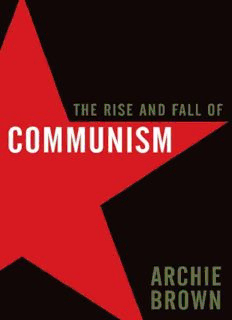
The Rise and Fall of Communism PDF
Preview The Rise and Fall of Communism
The Rise and Fall of Communism Archie Brown To Susan and Alex, Douglas and Tamara and to my grandchildren Isobel and Martha, Nikolas and Alina Contents Maps A Note on Names Glossary and Abbreviations Introduction Part One: Origins and Development 1. The Idea of Communism 2. Communism and Socialism–the Early Years 3. The Russian Revolutions and Civil War 4. ‘Building Socialism’: Russia and the Soviet Union, 1917–40 5. International Communism between the Two World Wars 6. What Do We Mean by a Communist System? Part Two: Communism Ascendant 7. The Appeals of Communism 8. Communism and the Second World War 9. The Communist Takeovers in Europe–Indigenous Paths 10. The Communist Takeovers in Europe–Soviet Impositions 11. The Communists Take Power in China 12. Post-War Stalinism and the Break with Yugoslavia Part Three: Surviving without Stalin 13. Khrushchev and the Twentieth Party Congress 14. Zig-zags on the Road to ‘communism’ 15. Revisionism and Revolution in Eastern Europe 16. Cuba: A Caribbean Communist State 17. China: From the ‘Hundred Flowers’ to ‘Cultural Revolution’ 18. Communism in Asia and Africa 19. The ‘Prague Spring’ 20. ‘The Era of Stagnation’: The Soviet Union under Brezhnev Part Four: Pluralizing Pressures 21. The Challenge from Poland: John Paul II, Lech Walesa, and the Rise of Solidarity 22. Reform in China: Deng Xiaoping and After 23. The Challenge of the West Part Five: Interpreting the Fall of Communism 24. Gorbachev, Perestroika, and the Attempt to Reform Communism, 1985–87 25. The Dismantling of Soviet Communism, 1988–89 26. The End of Communism in Europe 27. The Breakup of the Soviet State 28. Why Did Communism Last so Long? 29. What Caused the Collapse of Communism? 30. What’s Left of Communism? Acknowledgements Notes and Sources Searchable Terms About the Author Other Books by Archie Brown Credits Copyright About the Publisher Maps A Note on Names There is no completely consistent way of rendering people’s names in a book such as this. In languages with a different alphabet from that used in English, there is more than one transliteration system–for example, from Russian and from Chinese. In the Russian case, I have used a simplified version of the standard British system, adopted also by a number of North American journals. That means, for example, Trotsky, rather than Trotskiy (or the Library of Congress variant, which would be Trotskii). I have also favoured familiarity in the use of names. Thus, Trotsky’s first name in Russia was Lev, but he is better known in the outside world as Leon, and that is the form I adopt. I do not use the Russian soft sign in the text. What in strict transliteration would be Zinov’ev I render, as is more usual in English, Zinoviev. But when citing books or articles (and their authors) in Russian in the endnotes, as distinct from the main body of the book, I do aim to transliterate precisely. When a Russian author has published a book or article in English, I use the spelling of his or her name adopted by that author. In the case of Chinese names, I have generally used the pinyin system, adopted by most China scholars now–to take the obvious example, Mao Zedong rather than Mao Tse-tung. But here again I have made concessions to familiarity. Since Chiang Kai-shek was dead long before the old Wade-Giles system was abandoned by China specialists, his name appears in that familiar form. For similar reasons I have used Kuomintang, rather than Guomindang. (The former and older rendering of the name of the movement established by Sun Yat-sen in 1919 is still used in Taiwan.) Names which are written in the English alphabet, but with the addition of diacritical marks, such as, for example, the Slovak Alexander Dubček, or the Hungarian János Kádár, are used in precisely that way in the book. There are, however, people who have become better known in the anglicized version of
Description: